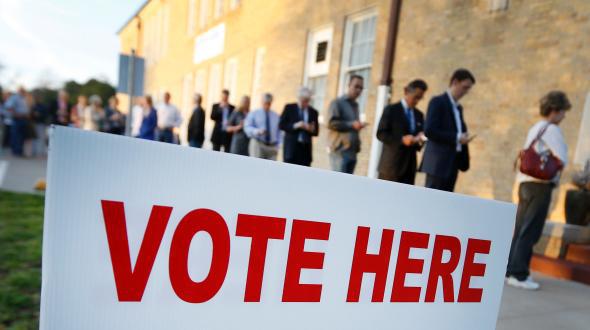A federal court ruled late Friday that Republicans in the state of Texas unlawfully gerrymandered three congressional districts along racial lines in order to maximize the party’s chances to retain the seats. The three-judge panel in San Antonio, in a 2–1 decision, ruled the three districts—two of which are held by the GOP—invalid, but they did not include instruction on how to remedy the gerrymandered electoral map. “The record indicates not just a hostility toward Democrat districts, but a hostility to minority districts, and a willingness to use race for partisan advantage,” U.S. District Judges Xavier Rodriguez and Orlando Garcia wrote in their opinion.
Here’s more on how the gerrymandered districts came into being from the Associated Press:
The GOP-controlled Texas Legislature approved the maps in 2011, the same year then-Gov. Rick Perry signed a voter ID law that ranks among the toughest in the U.S. Courts have since weakened that law, too. Judges noted the “strong racial tension and heated debate about Latinos, Spanish-speaking people, undocumented immigrants and sanctuary cities” that served as the backdrop in the Legislature to Texas adopting the maps and the voter ID law… Hispanics were found to have fueled Texas’ dramatic growth in the 2010 census, the year before the maps were drawn, accounting for two out of every three new residents in the state. The findings of racially motivated mapmaking satisfied Democrats and minority rights groups, who are now pushing a separate federal court in Texas to determine that the voter ID law was also crafted with discriminatory intent.
The Obama Justice Department joined the legal challenge on Texas’ highly restrictive voter ID laws that it argued specifically targeted minority communities. The DOJ under Trump, however, quickly reversed course and withdrew the government’s support. The Trump administration has not yet weighed in on the issue of gerrymandering. “The stakes in finding discriminatory intent are higher because it provides a window for opponents to argue that Texas should be forced to resume having changes to voting laws ‘pre-cleared’ by the Justice Department or a federal court,” according to the AP. “A 2013 U.S. Supreme Court ruling did away with preclearance by striking down a key provision in the federal Voting Rights Act.” Texas could appeal the case to the Supreme Court.
